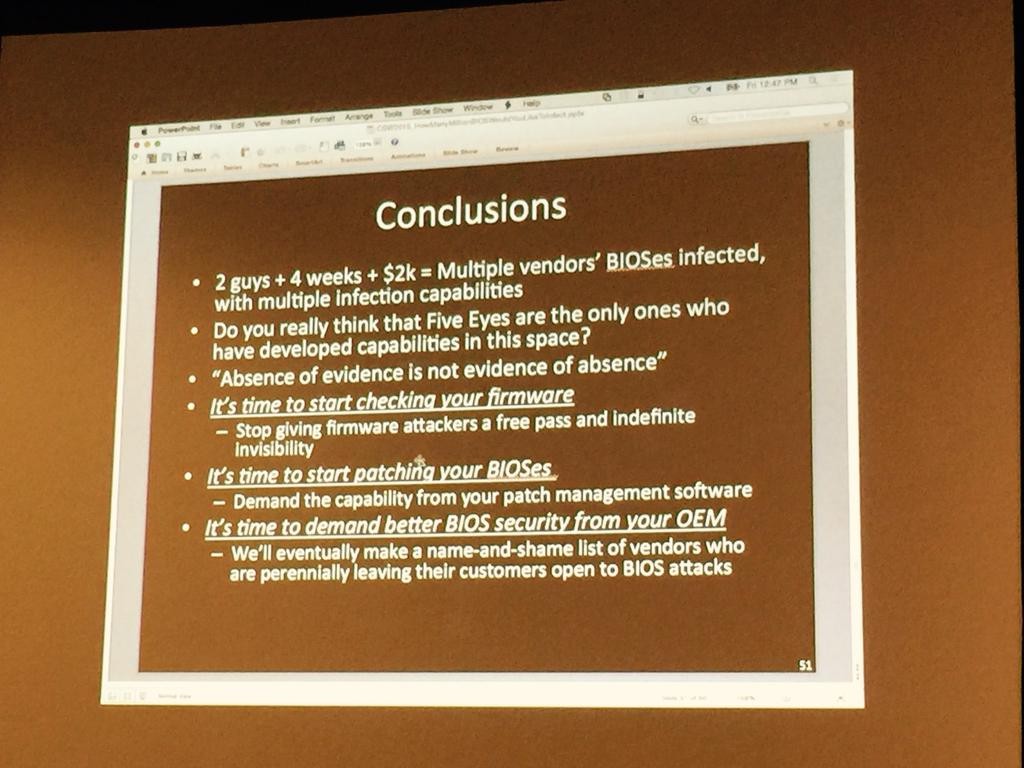
Last week, we had the privilege to participate in and present at the 15th edition of CanSecWest in beautiful Vancouver, BC, along with its famous accompaniment, the ever famous Pwn2Own competition. Yes, once again all major browsers were hacked, but they were not alone! BIOS and UEFI, 4G modems, fingerprints, credentials, virtual machines, and operating systems were among the victim systems successfully hacked by our fellow presenters.
The event gathers a very technical audience with a shared interest in the most recent attacks and the presenters delivered with a variety of demos that showcased their intended vulnerabilities beautifully and thus reinforced the conclusion that digital voodoo can turn obscure and seemingly innocuous vulnerabilities into mind-numbingly cunning attacks.

One of the most discussed presentations, and certainly one of our favorites, showcased the power of BIOS and UEFI hacking: two guys, Corey Kallenberg and Xeno Kovah of Legbacore, armed with $2,000 and 4 weeks of hard work were able to show how a long list of vendor BIOSes were not only vulnerable but could successfully be loaded with LightEater, an SMM implant capable of pilfering sensitive information from Tails OS and even exfiltrating that information in such a way as to bypass the OS entirely. We clearly agree with their conclusion, it´s time to start taking a harder look at firmware!
Firmware insecurity: absence of evidence is not evidence of absence
One of the very possible attack is the well-known ‘evil maid‘ or the ‘border guard’ approach: someone with physical access to your computer can just plug a small device (see below) and successfully reflash your system’s BIOS, rewriting it with malicious code, without so much as booting up the system.
Press a button and in a few seconds the handy green light will indicate the BIOS is p0wned
Another very interesting presentation by Jan “starbug” Krissler showed how high resolution photos could bypass biometric authentication. Pictures acquired through high-resolution cameras from a safe distance amounted to the successful theft of fingerprints, faces, and irises used by current biometric systems for authentication. The distance can even be extended through the use of infrared imagery! We spent the talk imagining the breach possibilities as an increasing number of ATMs nowadays rely on biometric input.
Please authenticate access to your bank account using a password you can never change: your fingerprint
We also saw presentations on MacOS DLL (dylib) hijacking, userland exploits on iOS 8, attacks using Windows PowerShell, and even the installation of a bootkit in a 4G modem by simply sending an SMS! All sandwiched between explanations of the work of the ever fascinating Google Project Zero Team. In one of these, Chris Evans walked the audience through how a ‘simple’ crash caused by a call with a negative length became an exploit on Adobe Flash Player.
Our own presentation was a walkthrough of the misuse of allowlisted tools to further all kinds of attacks, from APTs and Targeted attacks to banking trojans and ransomware. This ongoing project is intended to highlight the faulty foundations of the allowlisting approach to security and how allowlisting alone simply won’t protect you, from advanced and intermediary attackers alike! Stay tuned for a post on our findings.
In the end, we expanded our view as to the true breadth of vulnerable software and hardware. on which we depend daily. Security is a truly elusive state in an ecosystem composed of interwoven, dependent systems, each responding to the diverging priorities of a developer, an administrator, a user, and, of course, an attacker as well. The role of the security researcher that lives and breathes attack vectors and obscure vulnerabilities in search of the right digital voodoo has never been more important. And we can’t help but echo the sentiments of Dragos Ruiu and our own Eugene Kaspersky in thanking CanSecWest for bringing all these researchers under one roof and one banner to share that digital voodoo and successfully stave off the balkanization of our industry just a while longer.
CanSecWest 2015: everything is hackable
























Rodrigo Jorge
Awesome Post! Thanks for share with us Fabio and Juan! []’s